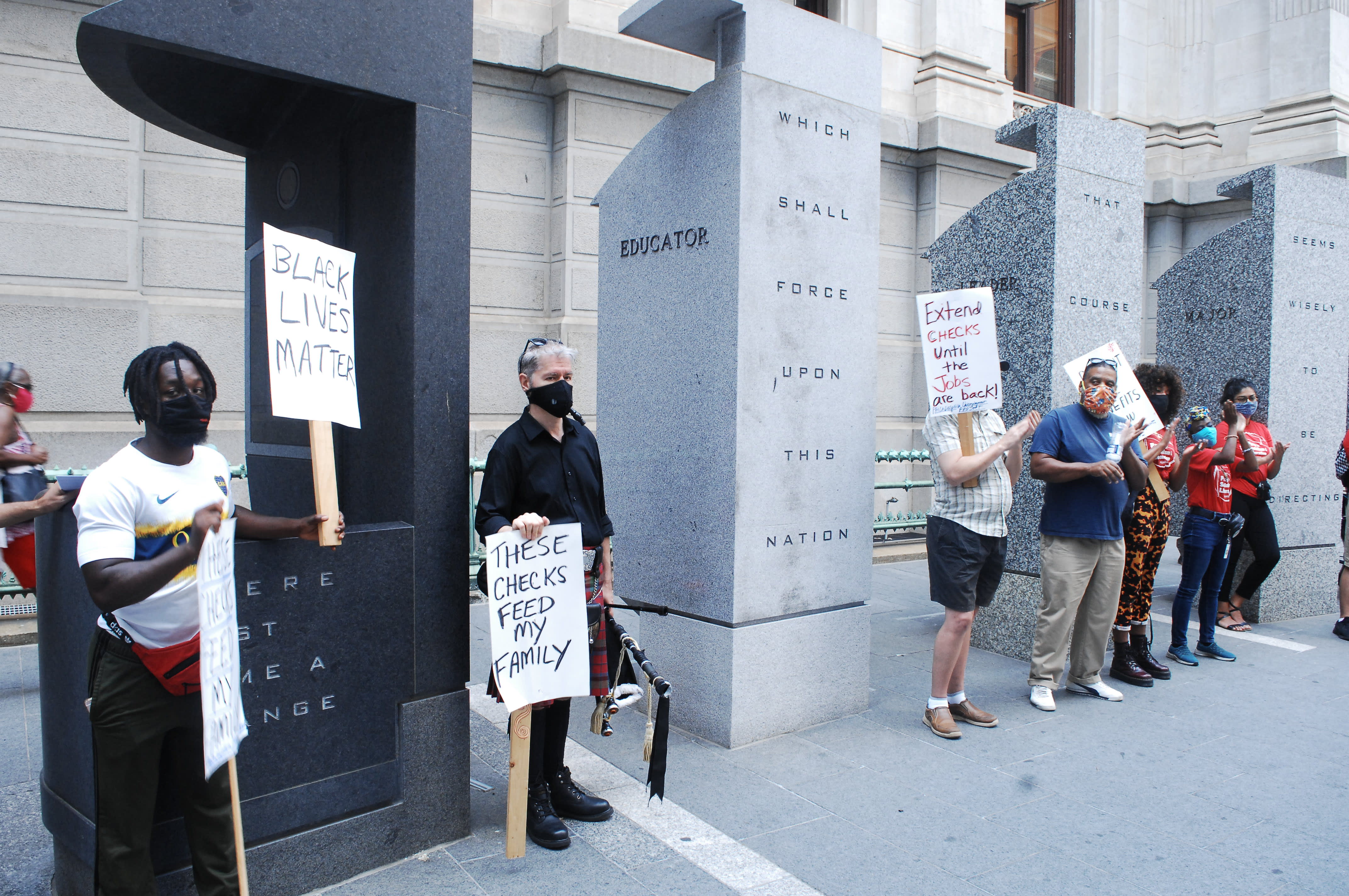Philadelphia residents rallied at City Hall to demand Congress return and come to a deal on unemployment and other key features of the HEROES Act.
Cory Clark/NurPhoto via Getty Images
At least five states have begun paying out a federal boost to weekly unemployment benefits. Others have signaled they’ll do so within days.
Arizona, Louisiana, Missouri, Tennessee and Texas are the first states to disburse the aid, a $300-a-week increase in jobless benefits. (States could choose to kick in an additional $100 a week, but most have opted against it.)
It’s been nearly three weeks since President Trump signed an executive measure creating the Lost Wages Assistance program.
The program will pay up to $44 billion in federal disaster-relief funding to unemployed workers. The weekly subsidy comes on top of benefits workers currently receive.
States must apply and receive federal approval to pay the $300 weekly subsidy. To date, 34 states have received approval.
States get an initial tranche of funding for three weeks of unemployment, covering the weeks ended Aug. 1 through 15. They must then apply weekly for additional funding.
First states
Arizona, Louisiana and Missouri were among the first states to receive federal approval for the lost wages assistance, almost two weeks ago. Texas followed shortly thereafter.
Arizona issued $252.6 million to 400,000 workers last week, according to Brett Bezio, spokesman for the state Department of Economic Security. All workers eligible for payments between the weeks ended Aug. 1 and Aug. 8 will get them in the next couple days, Bezio said.
More from Personal Finance:
Can you be evicted during the pandemic?
In most cities, it’s impossible to live on jobless benefits
Half of parents expect to lose income this back-to-school season
Texas paid out more than $424 million this week, out of its total $1.38 billion in approved funding, according to spokesman Francisco Gamez, spokesman for the state Workforce Commission.
Louisiana paid out $240 million to almost 300,000 eligible workers on Wednesday, according to a statement from the state’s Workforce Commission.
Tennessee started issuing the aid Wednesday, according to Chris Cannon, spokesman for the Department of Labor and Workforce Development. The state received $236 million in initial funding.
Missouri began processing the $300 federal supplement Tuesday night and workers should “soon” start receiving payments, according to a statement from the Missouri Department of Labor and Industrial Relations.
The state was approved for $200 million in total funding for roughly 100,000 eligible workers, according to the statement. It expects to issue the first retroactive payment by the end of this week, while the rest should be received by the end of next week.
A spokeswoman for the Federal Emergency Management Agency, which is overseeing funding for the lost wages assistance program, declined to say whether additional states had begun disbursing the aid.
It may be several weeks before many other states start making payments, due largely to administrative challenges.
The Colorado Department of Labor and Employment estimates payments won’t arrive until mid- to late September, for example.
Alaska believes it will take six to eight weeks to reprogram changes in the state’s technology systems necessary to disburse the aid, according to Cathy Munoz, deputy commissioner of the state’s Department of Labor and Workforce Development.
A $600 weekly federal supplement ended in July after Congress couldn’t agree on the structure of additional relief. Around 27 million workers were collecting unemployment benefits as of early August.
States that haven’t yet received federal approval for the $300 weekly subsidy include: Delaware, Florida, Hawaii, Illinois, Kansas, Minnesota, Nebraska, Nevada, New Jersey, North Dakota, Oregon, South Carolina, West Virginia, Wisconsin and Wyoming. The District of Columbia has not received approval, either. South Dakota will not apply for the assistance.
